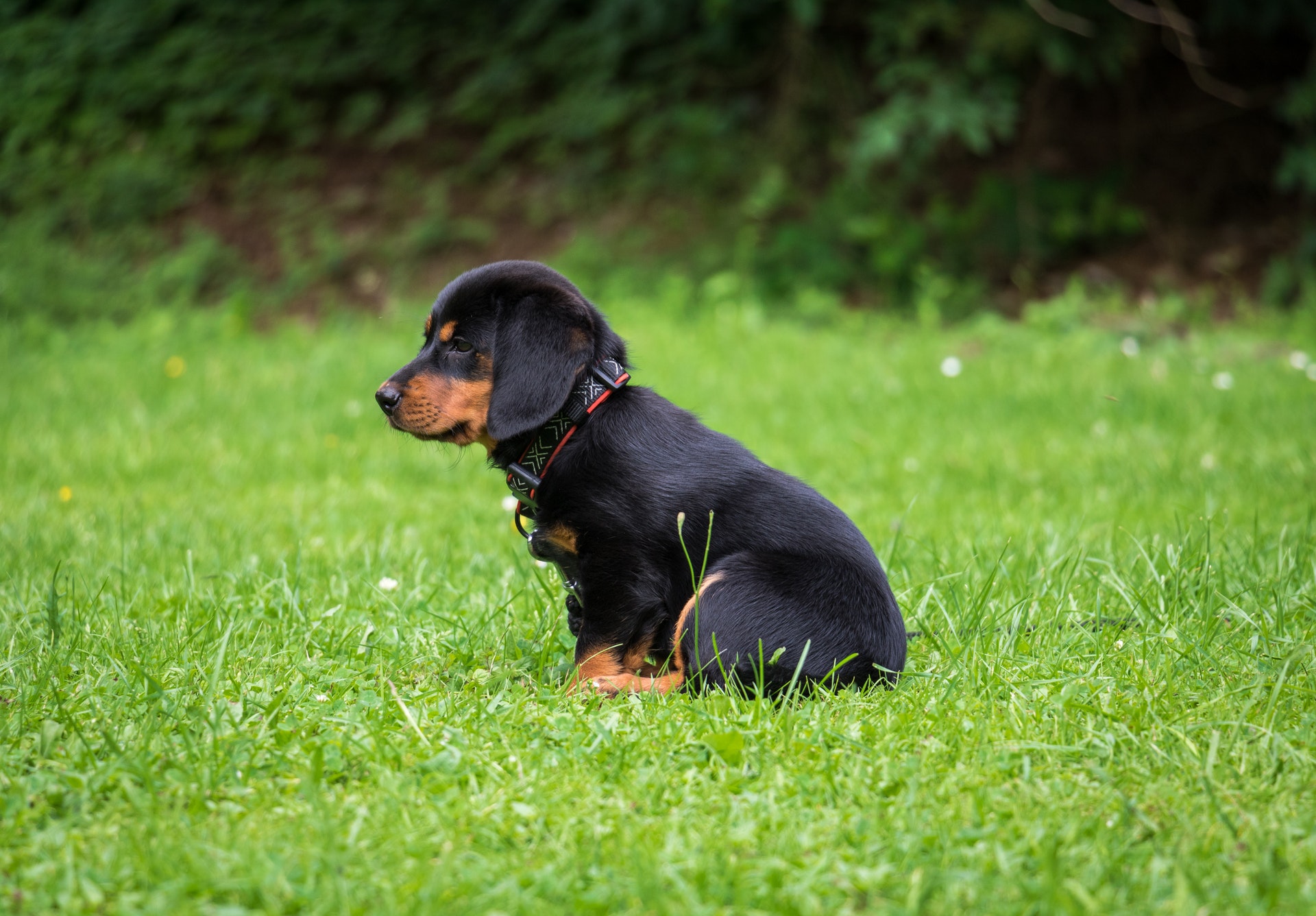If you looking for an answer to “what age should a puppy be toilet trained?” then you’ll probably get a lot of conflicting information.
And while most people will preach that 8 weeks is the optimal age to start potty training your little bundle of fluff. There are a few important factors you need to consider before diving headfirst into the process.
Because here’s the thing…
No two puppies are the same. They come in different shapes, sizes, and with their own unique personalities. And while there’s no hard and fast rule for each and every puppy, the idea that there’s a one size fits all approach isn’t really going to cut it.
For instance, consider a small Chihuahua with a short attention span and the bladder the size of a marble. Chances are their potty training experience will be quite a bit different from, let’s say, a Border Collie with strong bladder control and the intelligence of Lassie.
So with this information to hand, it’s safe to say that an individualized approach will be needed depending on the nature of your pup.
Now, before we get into the detail on the best age to start potty training, first a quick heads up. Learning how to raise your puppy can often be a minefield of misinformation which can ultimately set you up for failure.
This is why before you do anything else, I’d highly recommend checking out the Puppy Coach Program from Dan Abdelnoor over at The Online Dog Trainer. (see video below)
Inside the program, Dan uncovers the secret to raising your puppy the right way, by quite literally taking you by the hand and showing you step-by-step how he raised his own pup Moses from 8 weeks, all the way to a fully grown adult dog.
You’ll get the inside look behind the scenes at what it really takes to raise the perfect puppy, solve ANY puppy training problem, all while setting a solid foundation for your pup’s future.
Here’s the link to take a look: Click Here To Discover How To Quickly Solve All Of Your Puppy Training Problems While Setting A Solid Foundation For Your Pups Future… Even If You’ve Tried & Failed Before!
(video will open in a new window)
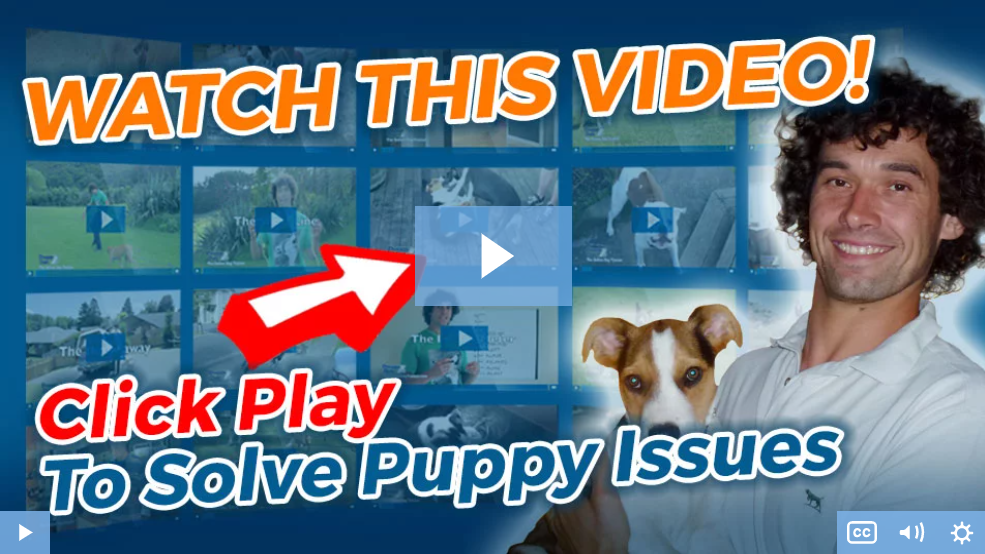
What Age Should A Puppy Be Toilet Trained?
Well, before we jump right in I should mention that puppies under 8 weeks old are still developing bladder control, So training before 8 weeks can often be impractical.
So with that said I almost always recommend you begin the potty training process no earlier than 8-weeks-old, or whenever you first bring your new puppy home.
It’s also worth noting that it can take anywhere from four to six months to full toilet train a puppy with some puppies taking up to a year.
And to make sure you’re fully prepared, here are a few things you’ll need prior to starting the training process…
- Leash, collar, or harness
- A crate with enough room for them to move around
- Baby gate to keep your puppy confined while unsupervised
- An enzymatic spray-cleaner to remove odors and stains
- Quality puppy food
How To Start Toilet Training Your Puppy
Typically, a puppy can control their bowel movements and bladder for around two hours.
However, this can vary from breed to breed.
So during the first few weeks, you will need to get used to taking your puppy outside frequently.
If your puppy is under three months, you should take him out once every hour. Gradually increasing the time between trips until your puppy learns how to give you the signal that he needs to go.
More often then not your puppy will show signs that he has to go to the bathroom.
Usually, they seem distracted, sniff around, leave the room or pace.
And remember that puppies typically need to go potty within 10-15 minutes after drinking, eating, sleeping, or playing.
So during this stage, you may need to wake up a few times during the night to let your dog outside.
You must be prepared for horrible weather when it happens.
- If it’s raining, take an umbrella with you to keep your puppy dry and comfortable.
- Keep a towel nearby to dry their paws to prevent muddy footprints in your house.
- If you live where it snows in the winter, shovel the area where you want him to relieve himself regularly
Training A New Puppy? Click Here To Discover How To Quickly Solve All Of Your Puppy Training Problems While Setting A Solid Foundation For Your Pups Future… Even If You’ve Tried & Failed Before!
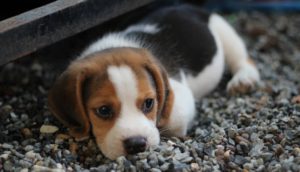
Crate Training
Confining your puppy in a cage for short spurts of time isn’t as cruel or horrible as it sounds.
It’s likely that at some point in your puppies’ lifetime, they’ll be transported in a crate for vet visits or traveling.
Some puppies and dogs actually prefer an enclosed space for security making crates ideal for toilet training.
And because dogs hate to soil where they sleep, crate training is an ideal option for teaching both bladder and bowel control during the early stages of toilet training.
Before you decide to go the crate route, make sure you use one that allows for your puppy to stand up and lie down comfortably.
Puppies will usually give you a cue that they need to come out to go potty by whining or scratching at the crate.
So make sure you pay close attention or they could eliminate in their crate.
Oh and one last thing…
…Never put water or food in the crate in the early stages of toilet training your puppy.
It only takes one accident and they’ll instantly develop a negative association with the crate which can often take weeks to undo.
Using Puppy Pads
While toilet training outdoors is the preferable option, some owners might not have a yard or the time to walk their pup multiple times a day.
That’s why many owners of small breeds or “toy” puppies prefer to use puppy pads, especially, in the cold winter months.
If you chose to toilet train with puppy pads, stick with one area of the house that’s easy to clean.
Any low-traffic areas such as a laundry room or a small bathroom are great places to start.
Lay out the puppy pads so they cover the floor. Change the puppy pads frequently throughout the day and leave a small portion of the soiled pad near or on top of the fresh one.
The smell will give your puppy the hint that this is where they relieve themselves.
When your puppy begins to use only one or two of the pee pads, start to slowly remove the others until there’s one left.
If you want to transition your puppy to going to the bathroom outdoors, lay a puppy pad on or near the designated area.
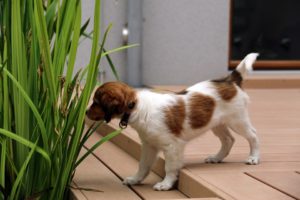
Litter Box Training
I know they usually for cats, but they can also be used to potty train small dogs.
Litter box training is ideal for puppy owners who live in an apartment building or work long hours.
You can use a large litter box or a plastic tub that allows for your puppy to turn around.
Just make sure the sides are low so your puppy can easily get in and out.
For the litter itself, it’s best to look for dog litter instead of the cat version because it has larger pellets that absorb puppy waste better.
There are many brands that carry activated charcoal, clay, and odor controlled dog litter.
And remember, always keep a pooper scooper and a trash can nearby so you can easily clean up your puppy’s waste.
Similar to the puppy pads, keep the litter box in a low-traffic area of your home that’s private.
And if you have a cat, make sure it has a separate litter box.
Cats will urinate outside of their litter box to mark their territory if they have to share.
The same rule applies if you have two dogs that are litter box training.
Encourage your puppy to use the litter box on command and reassure them that it’s a safe space for them.
You can ever encourage them by putting them in the litter box whenever they’re showing signs of needing relief
If your puppy jumps out of the box, put him back in and give them praise while they’re in there.
Set A Schedule
The ability to predict what time of day your puppy goes to the bathroom is a huge benefit which can often lead to quicker success.
Food and water will run right through puppies due to their small bladders so you must observe their behaviors to sense their signals.
Typically, you should let your puppy out first thing in the morning, after eating or drinking, and before bedtime.
Study the amount of time it takes for your pup to go to the bathroom after he eats or drinks, identify their triggers and you’ll have a much easier time with the whole training process.
Knowing your puppies schedule will help make toilet training a breeze.
Try to take your puppy outside or put them on a puppy pad a few minutes before they usually go.
Feed your puppy at a set time every day and limit their water intake before bedtime.
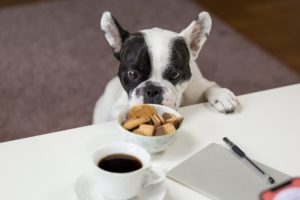
Control Your Puppy’s Diet
Puppies have small stomachs that aren’t ready to digest a lot of food.
Most veterinarians will recommend that puppy feedings are broken up into three smaller meals throughout the day.
What I recommend is choosing a dog food that’s designed specifically for puppies and is made from high-quality ingredients that will cause them to eliminate less.
The wrong puppy food can cause diarrhea and make toilet training an even bigger headache.
Puppy food made with poor ingredients contains filler that’s tough to digest.
They also require your pet to eat more to get the nutritional value they need to grow.
Use Rewards
Puppies don’t respond well to scolding when they’ve had an accident.
It confuses them because they have no idea what they did wrong.
You need to understand that if your puppy has an accident then the blame lies solely with you.
Accidents happen so if you do start to see him eliminate indoors just calmly and take him outside until he’s finished.
This is the key to building a solid relationship that is based on trust and loyalty.
If you try to humiliate your puppy or make them feel bad about having an accident then your just asking for trouble.
You should always reward your puppy with praise when they’re doing the right thing.
Dogs love positive encouragement and you can do so by clapping, cheering, petting, and kissing your puppy.
If you choose to use treats, give them to your puppy after positive verbal affection.
And don’t disrupt your puppy by praising them while they’re “doing the deed.”
Accidents Happen
At some point, your puppy will have accidents.
It’s inevitable so just accept it and above all make sure you’re prepared
Personally, I like to have an enzymatic spray-cleaner to hand that’s specifically designed to eliminate the smell of urine because if you don’t remove the odor, your puppy will just assume this is where they should continue to go to the bathroom.
And if you notice your puppy begin to squat indoors, simply carry him outside or to his potty area immediately.
When your dog has an accident indoors, redirect him outside or to where you want him to use the bathroom.
Consistency is key here so don’t consider your puppy toilet trained until he’s completely accident-free.
If a week has passed without any accidents that’s great.
But if you’ve stopped potty training and your dog is having the occasional accident then your job isn’t done and you need to remain consistent until they are completely accident-free.
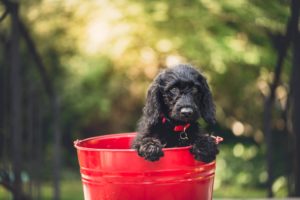
Conclusion
You really need to remember that no puppy or owner is the same.
Your training methods, type of puppy, and age will ultimately determine how fast or slow your puppy gets the hang of toilet training.
The sooner you begin training the better.
Puppies who come from shelters might be harder to toilet train since they are likely used to going to the bathroom where they sleep.
But with time, patience, and consistency, your pup will be a potty training champ in no time at all.
